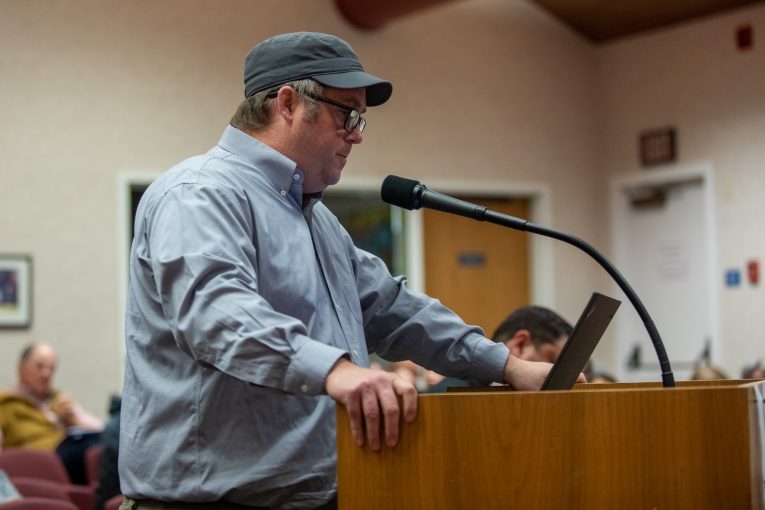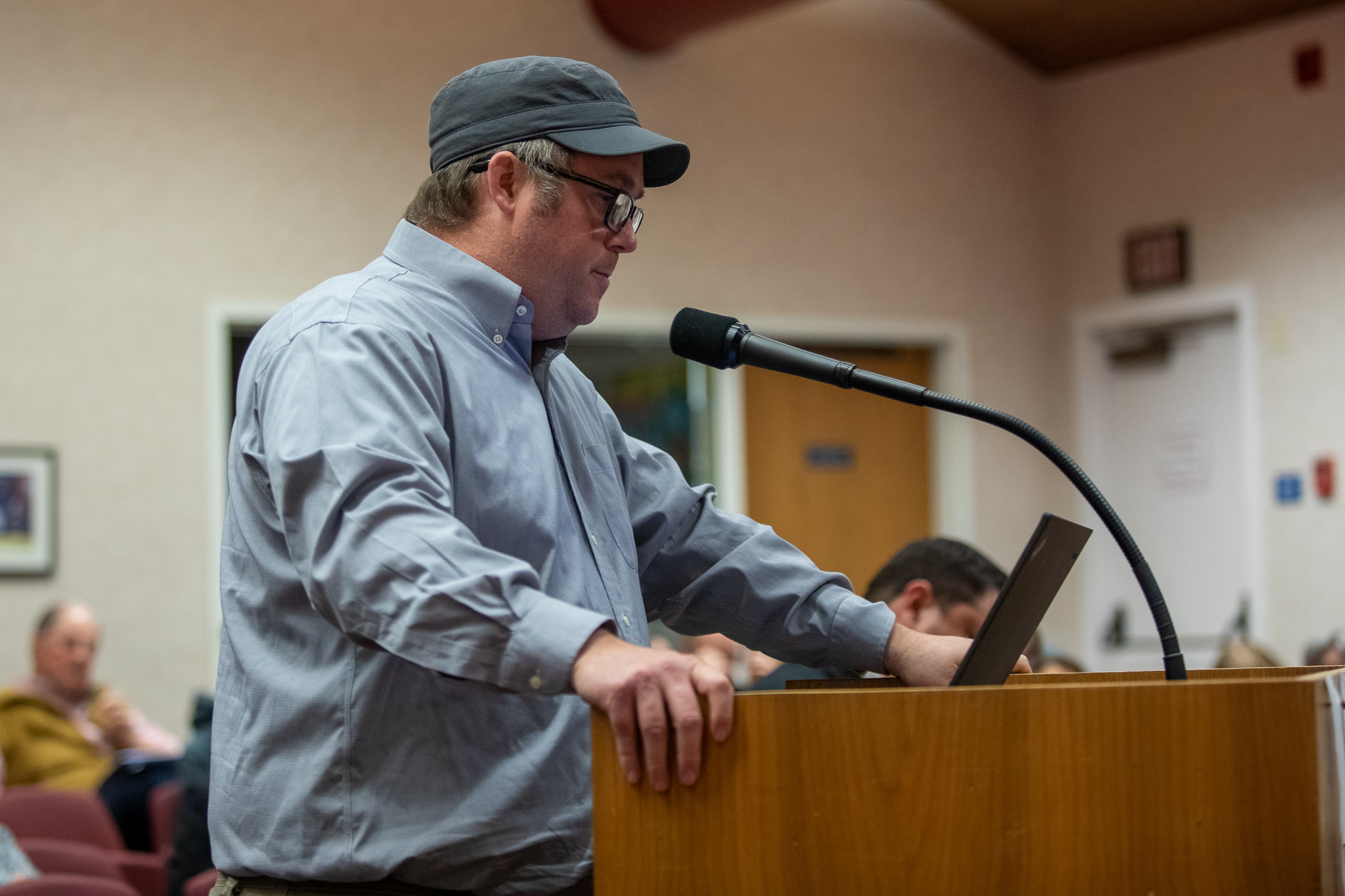

On Tuesday, council pulled a consent item that authorized the city to spend around a quarter million dollars on a Supplemental EIR (SEIR), with the costs reimbursed by the project applicant for the Aggie Research Campus.
While the current proposal for the ARC is “in substantial conformance with the Mixed-Use Alternative version evaluated in the 2017 certified EIR (for MRIC),” there are some changes of circumstances particularly with regard to traffic that the EIR would examine.
The item brought concerns from critics of the project, including the criticism that there was an attempt to hide this as a consent item.
As Councilmember Lucas Frerichs pointed out, the council received requests from the public to pull the item from consent – which they did.
“It’s on the public agenda,” he said. “It was posted last … Friday. It has received a variety of mentions in local media as such. I don’t think there’s any smuggling going on or any subversiveness.”
Rik Keller, speaking during public comment, told the council that “this project will actually exacerbate the existing jobs-housing imbalance and increase commuting to our community which according to  SACOG is already a net importer of commuters and already has the longest commuting times in the whole region.”
SACOG is already a net importer of commuters and already has the longest commuting times in the whole region.”
He criticized the consultant Rainey, saying they “messed up the jobs-housing ratio in the previous EIR and misstated the analysis. They need to be directed to get their analysis right this time.”
Mr. Keller later added, “I would push for a subsequent EIR to be considered rather than the weak and rushed supplemental EIR plan that’s proposed right now.”
Roberta Millstein said that while Rainey explains why an addendum isn’t sufficient, “they don’t explain why we don’t need a subsequent EIR.” She said, “I think the council needs to insist on hearing the justification for choosing a supplemental EIR over a subsequent EIR which is more extensive.”
She notes as well that Rainey only mentions traffic as a change factor since 2016, but “it doesn’t mention other potentially changed factors like air quality, noise, biological features – I think council needs to insist that all potentially changed factors need to be considered for the EIR is complete.”
Ms. Millstein like Rik Keller was concerned about the compressed timeline for the release and consideration of the EIR.
She pointed out, “Rainey’s timeline does not allocate time for the commissions to comment on the EIR.” She said that the council needs to make sure “that the relevant commissions have time to bring their expertise to bear on the EIR.
“The applicant not the city put this project on hold and they’ve had plenty of time to bring the project back. There is no justification for rushing things now,” she added.
“ARC would be a massive project, much larger in scale than anything else in Davis, on prime farmland, 200 acres, and it deserves to dealt with thoughtfully,” she said.
Colin Walsh pointed to major changes in both the project and the circumstances. “Both of them with new potential significant impacts that require additional environmental above and beyond the EIR prepared in approximately 2017… It probably meets the criteria for performing a subsequent new EIR.”
He called for the city to circulate and prepare “a clear new project description – the current project description is very vague – to the old one and a checklist that documents all aspects of the project that has changed or not changes and the significance of those changes.
“The council should be insisting on this from the staff as a starting point,” he said.
City Manager Mike Webb explained the city’s rationale in proceeding on a supplemental rather than subsequent EIR.
“What is before the council tonight is a request to enter into a contract to begin environmental analysis,” Mr. Webb explained. He said they will start by looking at “those areas where there’s likely to have been a change in circumstances.
“We have very good reason to believe… that traffic is one of those changed circumstances that needs a careful look at,” he further explained. For him that means that they look at the preparation of a supplemental EIR. “Biology is the other element that we have identified as wanting to make sure that we take a look at it to see if there have been any changes in circumstances or conditions on the site or in the area.”
He said that air quality and noise would be looked at “because they are tied to traffic – the traffic analysis.” That triggers a look at greenhouse gases and health risk assessments as well, he explained.
“Those are all affected or impacted by the traffic data and the analysis that happens there,” he said.
Mike Webb said, “The difference between a supplemental EIR and a subsequent EIR is a subsequent EIR studies all of the chapters under CEQA.”
That would include areas such as Cultural Resources, Ag Resources, Geology, Hazards – “those chapters would all be revisited.” He said, “At this point in time, just based on preliminary look at the site in the time that’s passed, it was just 2017 when the EIR was certified, I just think that there’s not a strong belief that cultural and geological resources have changed in the last two yeas on the property.”
Mike Webb said it comes down to studying those things that we believe or know that circumstances have changed versus “basically opening every chapter – even if those chapters don’t need to be opened.”
He did say that they want to start looking at the analysis and “the consultants won’t know for sure until they start digging into it if there are other areas that would necessitate looking at.
“Addendum would not be an appropriate mechanism to look here,” he said. “At this level, a Supplemental EIR would be the appropriate starting point for their analysis.”
Council agreed to approve the item on a 5-0 vote to move the process forward.
—David M. Greenwald reporting


“I just think that there’s not a strong belief that cultural and geological resources have changed in the last two yeas on the property.”
While the ground may have shifted on development in the last two years with both Nishi and WDAAC passing, for some, the cultural opposition to everything remains the same.
I expect a burrowing owl to be found on the site any day now.
There are burrowing owls on the site, especially now that it’s an empty field. They have the city’s 25 acres they can use as BOH.
Ron G.: one cultural thing that has remained the same is the Council kowtowing to business interests and trying to rush projects through without adequate scrutiny.
If we truly kowtowed to business interests, wouldn’t we like have more business in town?
This article does not discuss a few interesting occurrences at the meeting:
1) Mike Webb responded to demands and announced at the meeting that the City would now hold a public meeting for scoping the EIR.
2) Unlike the previous Council meeting, no UC Davis students were “mobilized” by the developer to speak in favor of the project.
3) Mayor Brett Lee admonished his colleagues not to stick important items like this on the consent calendar in the future. They should be listed as full agenda items with discussion.
And something that Keller didn’t discuss – the three of them are wrong to demand a subsequent EIR and Mike Webb’s explanation was spot on.
A competent CM does not put controversial items on the consent calendar without first polling the CC individually (the Mayor in particular) to see if there are objections.
Mark West stated “A competent CM does not put controversial items on the consent calendar without first polling the CC individually (the Mayor in particular) to see if there are objections.”
Nor does a competent City Council out items on the Consent Calendar that require them to make decisions between various courses of action.
There are definitely multiple layers of incompetence here.
Yes, that has been my experience with posters on the VG as well..
Careful, WM. That could be considered DEROGATORY in these parts.
I am not really understanding the vitriolic comments here. An error was made in placing an item on the consent calendar. The error was caught and a better process decided upon. Is this not precisely how our systems are supposed to work? Do we want to call “incompetence” on the basis of one error? Can we not let the individual involved learn and improve without public flagellation? None of us are in the council member’s head and thus privy to motivation. The system worked and I am good with that.
I dispute that it was an error. I also dispute that there was any ulterior motive in placing it on consent. I assert it was a ministerial act, and belonged on the consent calendar.
True story. It would have been an error (and politically cloying) to have originally have placed the item on the regular calendar, but scheduling it as a Public Hearing would have been far worse.
As I have pointed out previously, ANY consent calendar item can be pulled, called up for discussion and/or deferral, by a CC member, and over a 32+ year career, cannot think of a single time that a Consent Calendar item was NOT pulled, upon the request of a citizen(s) to have a CC member(s) pull it for discussion/deferral.
Yep… asserting that there was an error by staff, or a “conspiracy”, definitely proves that point. Incompetence, ignorance, or an “agenda” to cast aspersions… by those who so assert… take your pick.
Tia is correct… the “system”, including procedures and protocols, worked… SOP… nothing more, nothing less… there were no ‘errors’, tho’…
I’m with Bill for once, an error was not made. You don’t put items of this sort on regular calendar
Damning with faint praise… but I’ll take it…
Tia Will stated “The error was caught …” This is a classic example of the problems of using the passive voice. It is equivalent to “mistakes were made.”
This formulation erases the active parties who caught the “error,” pointed out the error, were criticized by the Vanguard for pointing out other consent calendar errors in the past, were criticized by Council for pointing out this and other consent calendar errors, and whose pressure led to the Mayor to make a statement that he and his colleagues should stop making these kind of errors.
I haven’t seen any vitriolic comments on this thread. But maybe that’s because I have already blocked commenters who are serial offenders.
What was criticized by the Vanguard in the past? He said 391 which seemed very different. What else?
You’re still in denial, Rik… and/or playing games… there were no “errors”, so, magnitude, etc. of the errors (that never “existed”) is quite pointless… like arguing about the color of the unicorn…
Your error, which you continue to compound, is insisting that errors occurred. That’s a pretty big error! Smacks of incompetence…